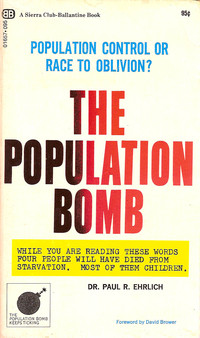
In his 1798 book An Essay on the Principle of Population, Reverend Thomas Robert Malthus observed that a nation's food production increased arithmetically (1, 2, 3, 4, 5, 6, 7, 8, etc.), but population growth increased geometrically (1, 2, 4, 8, 16, 32, 64, 128, 256, etc.). Reverend Malthus postulated that there would be a point when the population growth would outstrip food production. This has since been known as the Malthusian Trap, in that "Populations had a tendency to grow until the lower class suffered hardship, want and greater susceptibility to famine and disease". Malthus essay is one of the articles that Charles Darwin, who had an experience of breeding pigeons, read that lead him to think of evolution because there was a constant "battle" between populations of species for survival, he deduced that those which have advantageous genes will be "selected" naturally as the disadvantaged will die out i.e. go extinct. Our dear Reverend's solution was, even more, darker even for the 16th century, that they exterminate the poor as a form of Eugenics. He wrote
"Instead of recommending cleanliness to the poor, we should encourage contrary habits. In our towns, we should make the streets narrower, crowd more people into the houses, and court the return of the plague. In the country, we should build our villages near stagnant pools, and particularly encourage settlements in all marshy and unwholesome situations. But above all, we should reprobate specific remedies for ravaging diseases; and those benevolent, but many mistaken men, who have thought they were doing a service to mankind by projecting schemes for the total extirpation of particular disorders."
The British government had a Malthusian view of the Irish potato famine of the 1840s, in the words of Assistant Secretary to the Treasury Charles Trevelyan, which was an “effective mechanism for reducing the surplus population.” Although the British government has explored Malthusian thinking as restricting the poor and discouraging children among the poor to prevent overpopulation. It had been thought of as a means of social engineering and eugenics in developing countries, who always suspected that the developed countries had an ulterior motive, especially when giving free vaccines. Since the forced sterilisation of the middle of the last century by the Nazi and the US government culminating in the 1927 Supreme Court case Buck v. Bell, in which the justices legalised the sterilisation of “undesirable” citizens, this resulted in over 70,000 US Citizens being sterilised. Hence, especially in advanced countries worldwide, state population control is viewed as being wrong. China's one-child policy might have long-term effects, as the population is skewed towards males, which has also increased the number of abortions and sterilisations. Even after the policy was rescinded, China’s birth and fertility rates remained extremely low, leaving the country with a rapidly ageing population and a shrinking workforce, similar to Japan.
"Malthus' predictions never came true. He would be surprised that almost 200 years later the world's population is much larger and, for the most part, better off. There have been famines, but they have had more to do with local conditions and politics than with the inability of Earth's resources to support the population. Malthus did not foresee that pesticides, machines, refrigeration, and other technical advances would make it possible to feed enormous numbers of people very well. Except in cases influenced by war and political repression, starvation is rarely a widespread problem these days; in advanced nations, obesity is a far greater threat to health than starvation. Life expectancy in the developed countries has nearly doubled, from 40 years in the 18th century to well over 70 years now."
One thing Malthus did not foresee is the ingenuity of humans. Another author who warned of a disaster was Paul Ralph Ehrlich in 1968 in his book "The population bomb". Which early editions started with
"Malthus' predictions never came true. He would be surprised that almost 200 years later the world's population is much larger and, for the most part, better off. There have been famines, but they have had more to do with local conditions and politics than with the inability of Earth's resources to support the population. Malthus did not foresee that pesticides, machines, refrigeration, and other technical advances would make it possible to feed enormous numbers of people very well. Except in cases influenced by war and political repression, starvation is rarely a widespread problem these days; in advanced nations, obesity is a far greater threat to health than starvation. Life expectancy in the developed countries has nearly doubled, from 40 years in the 18th century to well over 70 years now."
One thing Malthus did not foresee is the ingenuity of humans. Another author who warned of a disaster was Paul Ralph Ehrlich in 1968 in his book "The population bomb". Which early editions started with

Ehrlich is still alive today, but remains largely unrepentant in retrospect. Ehrlich believes that The Population Bomb was "way too optimistic". In a 1971 speech, he predicted that: "By the year 2000 the United Kingdom will be simply a small group of impoverished islands, inhabited by some 70 million hungry people." "If I were a gambler," Professor Ehrlich concluded before boarding an aeroplane, " I would take even money that England will not exist in the year 2000." He has been another prophet of Doom whose predictions have failed to come to pass. Still, on the whole, we have not done too bad .... but for how long? These soothsayers and prophets may not be too wrong, as there is always something threatening to wipe out civilisation, and of course, there is the Fermi paradox, great filters

https://www.youtube.com/watch?v=xvlt_JId91M
ReplyDelete